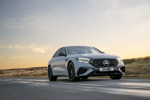Professor Jim Saker reflects on a need to focus on automotive retail's opportunties to see the "bright side" of the current economic gloom in his latest opinion article for AM Magazine.
It has always been said that bad news stories create more interest than positive ones in the media.
To be fair, there seems to have been a surfeit of dark and dismal news over the past months, so it is almost inevitable that people will have a general feeling of negativity.
Over the years, I have always been staggered by the resilience of the retail automotive sector to be flexible enough to grab opportunities in the face of challenges.
However, looking at recent research, predictions that counter some of the more negative stories have been circulating.
There have been several misleading surveys undertaken, mostly based in London and the south-east, saying young people aren’t interested in cars or, more specifically, in owning a car.
An interesting piece of research has been provided by Auto Trader UK which has looked at the relationship between the UK population and driving licence uptake.
Generally speaking, the larger the population, the more cars on the road.
Auto Trader commercial director Ian Plummer states in a presentation that the common assumption that young people are less keen on driving is not reflected in its analysis, with a growing population of younger cohorts having a driving licence.
This figure is probably understated, with a backlog of young people waiting for driving tests.
They may not all want to buy a car, but the desire for car usage seems to be steadily growing.
The other worry is that the move towards battery electric vehicles (BEVs) will result in a decline in aftersales revenue that may damage the viability of dealer networks.
At least for the next few years, this is unlikely to be the case.
Perhaps the most significant evidence for this emerged supporting the story of Halfords share price which jumped 15% in early September.
It reported that total sales in the 20 weeks up to August 19 were 9.2% up on the previous year, but were, in fact, 30% up on the equivalent pre-pandemic.
During the pandemic bike sales had boomed, but this had now quietened down.
The statement that caught my eye was that the average age of the UK’s private car fleet was the oldest it had ever been. I assume the figures quoted were from the World War II onwards, but this is a quite staggering position to be in.
The opportunity for the service side of the sector to take off over the next year or so would appear to have real potential, especially as the UK Government has stepped away from switching MOTs to every two years.
The structural resilience of the sector of being able to generate multiple revenue streams means that in generally dark times there is a bright side.















Login to comment
Comments
No comments have been made yet.